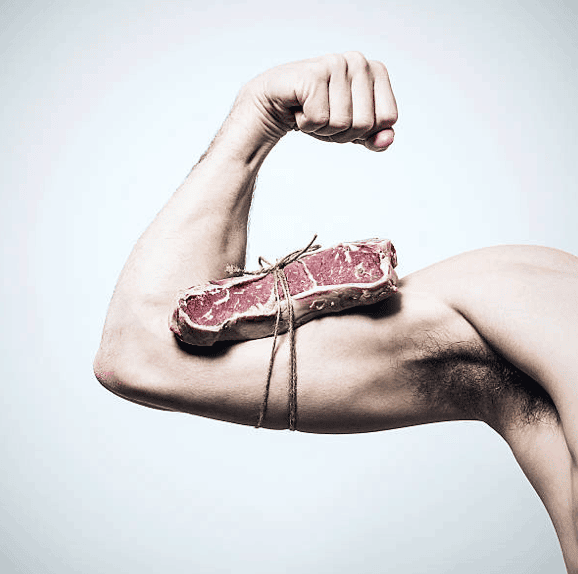Mass gain is a fundamental step well known to bodybuilding enthusiasts. No more improvisation. To achieve this, there are rules to respect. It is necessary to be rigorous to sculpt your body and diligence to achieve your goals. In this article, you will learn how to determine the right time to start gaining weight. We will then discuss in detail the 2 inseparable elements that are the nutrition and thetraining. Finally, you will learn to interpret and manage your body's reactions to obstacles you may encounter. In weight training as elsewhere, hard work always pays off! Are you ready?
Mass gain: determine the right time
Following a weight gain program is not something you decide to do overnight. It is important to ask yourself a certain number of questions, the very first being know your goal. Do you dream of a muscular and fat-free body for this summer?
At the risk of disappointing you, this is not achievable in the same amount of time, except perhaps in the first few months of weight training for a beginner.
Why do you ask? Well, simply because Muscle development and fat loss have very different approaches. Gaining muscle mass requires an increase in calories. Gaining muscle always involves a slight gain in fat mass. On the other hand, losing weight requires a calorie deficit. Your body, deficient in some way, will be forced to draw on the fat reserves stored in your body.

You can, however, limit the amount of fat you gain. To do this, you will need to set reasonable goals and be patient. Ideally, you should aim to gain a maximum of 2 kg per month (i.e. between 3 and 6 kg over 3 months) thanks to a specific program and repeat these 3 months as many times as you wish to reach your objectives.
So to know if it's the right time to start your weight gain, use a mirror or a camera. If you notice a lot of fatty areas, postpone your bulking and go for a dry one instead. If you have a lean, trim or normal physique, or if you use the skinfold measurement method and your fat level is less than 16 %, you can consider mass gain.
To be sure of your choice and to check which program best suits your expectations, click on the start button and let yourself be guided. You will get your answers instantly:
Nutrition: 5 rules to follow for successful weight gain
Rule No.o1: Increase your calorie intake
During a weight gain program, what you eat plays a major role. Forget the false beliefs that continue to be promoted such as having to restrict yourself or reduce your calorie intake.
No! To gain muscle, you must eat enough. Limiting your fat intake does not mean reducing your calorie intake. On the contrary, to gain mass, you must do the opposite, namely follow a high calorie diet.
To make your diet more calorie-rich, increase your usual intake by 250 kcal by eating more low- to medium-GI carbohydrates (starches). If that's not enough and you're having trouble putting on weight, prepare your own gainers for your snacks (use whey with oat powder for example).
Rule No.o2: Hydrate yourself
To promote muscle building, you'll need to stay well hydrated during your weight gain program.
Don't drink because you are thirstyDrink with your muscles and your health in mind. Ideally, take small sips every 15 or 30 minutes. For example, if you weigh 70 kg, you should drink an average of at least 2 liters of water a day, and more if you weigh 90 kg.
Count on an additional 30 cl for every ten extra kilos. During the summer months, don't hesitate to increase your water intake by 30 %. However, avoid over-hydration to avoid straining your kidneys and going to the toilet too often. If you haven't yet acquired the reflex to drink, remember to take a water bottle with you and drink it all during your training session.
Rule No.o3: Think about amino acids
Amino acids are essential elements for muscle growth. You will find them in proteins. If your goal is to gain mass, eat 5 or 6 daily meals containing protein.
To promote rapid muscle development, don't hesitate to eat them as a snack. As an athlete, the recommended dose is 2 g of proteins per kilo of body weight. Wondering what type of protein promotes mass gain?
Favour animal proteins to get all the essential amino acids you need. By combining proteins, legumes and cereals, you provide all the amino acids necessary for the development of your muscles.
Rule No.o4: Eat fat
Fats are essential for good health. In order to maintain proper hormonal function and to promote muscle gain, you must not eliminate them.
Choose foods such as avocado, salmon, olive oil, sardines and nuts, known to be rich in omega-3. Note that during a mass gain program, saturated, monounsaturated and polyunsaturated fatty acids can be ingested in equivalent proportions. In addition, 25 to 30 % of your caloric intake should be provided by lipids.
Rule No.o5: Abuse of vitamins and minerals
In concrete terms, vitamins and minerals are essential for the proper functioning of the body. They are also essential for muscle growth. Micronutrients are present in large quantities in raw fruits and vegetables and tend to disappear during cooking.
Eat them without moderation. This will help boost your immune system. Note that micronutrients are also involved in protein synthesis. That's why you can never neglect their importance if you are building mass.
Training: 5 basics to optimize your weight gain
Now that we've talked about nutrition, let's look at strength training and what you need to do to optimize your mass gain.
Basis no1: Warm up before your session
It's something I remind myself regularly: whether you're into weight training or any other physical activity, don't neglect the warm-up stage!
Warming up prepares your heart for intense exertion and prevents heart rate abnormalities, in case you forget.
It has only benefits:
- For the conditioning of the muscle during a mass gain program;
- For the brain, the nervous system ;
- Joints;
- Blood circulation;
- Mind;
- etc.
As a reminder, the warm-up starts with the mobilization of your joints and then by performing your first exercises with light loads and at the end of the training, plan 10 minutes of cardio to eliminate waste from the body rather than doing static stretching exercises.
Basis no2: Lift heavy but controlled
To succeed in gaining mass, if heavy loads are to be preferred, they must however be controlled. It is always unfortunate that many practitioners seek to lift as heavy as possible at the expense of technique. This will not only lead to a greater risk of injury, but will also make it less effective to build up the muscles involved.
To manage your weight gain, the ideal is to establish a program composed of different cycles of progressionThis will vary over the course of the weeks. Your training session for mass gain should last 45 minutes to 1 hour and 15 minutes depending on your level and metabolism (the faster your metabolism the shorter and more intense your session should be).
To avoid routine, you can change the order of your exercises and use intensification techniques every 4 to 6 weeks or so. Note that to succeed in your program, you must be very persistent. And yes, we always come back to the same observation: to reach your goal, rigour and seriousness are required!
Basis no3: Target large muscle groups
Your training program for mass gain should be composed primarily of exercises that promote mass gain. Therefore, it is best to focus on large muscle groups rather than individual muscles. At the same time, your exercises should work as many joints as possible. It is not by soliciting the biceps that you will gain in mass.
Choose sets that strengthen the contractile and stabilizing muscles such as squat, military press, barbell curl, bench press, deadlift, etc. Also remember to balance upper body exercises with those more specific to the lower body.
Basis no4: Reduce cardio if you want to gain mass
Many people wonder if cardio is conducive to mass gain. It depends a lot on your metabolism and your overall activity level.
Generally speaking, cardio exercise leads to a loss of calories. This also implies a drop in the levels of amino acids essential for muscle development, as discussed above in the nutrition section.
So too much cardio will destroy your muscle mass gain. I would like to qualify this by saying that it is a very good exercise for the heart that will also allow you to recover better from your sessions (and therefore indirectly beneficial to mass gain).
If you want to gain muscle mass and not burn too many calories, limit your cardio sessions to 10 moderate minutes at the end of the session or outside of the days of training of muscular (walking, cycling) 2 to 3 times 30 minutes per week. If you have a very fast metabolism and you can't gain weight even if you eat a lot, forget about cardio!
Basis no5: Rest between sessions
How often should I train to gain mass? This question also comes up regularly and Just because you train more doesn't mean you'll gain more.
Even if you want to reach your goals quickly, your muscles need rest. Whether in terms of days off or hours of sleep, your body needs to recover. Practice 3 to 5 sessions a week.
Two recovery days during the week or weekend and sessions lasting no more than 1 h (1 h 15, if you include the warm-up) are a good pace.
As far as night-time rest is concerned, get 7/8 hours of restful sleep. Going to bed early and waking up feeling refreshed boosts the effectiveness of your weight-building workouts and avoids the harmful effects of stress on your metabolism.
Weight gain: know how to analyze and react in case of stagnation
Weight stagnation during mass gain is not uncommon. It can be due to several factors. You should not be discouraged, but rather analyze it to quickly implement solutions that will allow you to revive it. The values indicated by your scale have not moved for 2 weeks or more? Ask yourself the right questions and react accordingly.
The main reasons are:
- Insufficient caloric intake;
- Ineffectiveness of the training program.
Caloric intake and mass gain
So yes, you are eating more than usual, but you are not seeing any improvement. Your problem, which is quite common among athletes, may be that you are not measuring the amount of calories you are consuming.
Dosing your holds is very important in mass gain. You need to increase your calorie intake by adding between 250 and 300 kcal during this period to reach your mass gain goals. Weigh your food, especially at the beginning! If you don't gain weight it means that you are not yet in a caloric surplus.
Muscle and weight gain program
Another reason that can explain the stagnation in mass gain is the inefficiency of the training program practiced. Yes, it is quite possible to exercise regularly without any impact on your muscles.
In rare cases, contrary to your expectations, overtraining can lead to fat gain and muscle loss. A coach can help you to see your mistakes more clearly. His experience will allow you to quickly reverse the trend and to know the exercises adapted to your morphology to progress in your mass gain.
How to boost your weight gain?
As we have just seen, stagnation can be analyzed. If your goal has not yet been reached, while your balance shows the same figure for several days, it is time to think about a relaunch.
Reflex no.o1 : review your diet.
Does it correspond to a weight gain program or should it be improved?
If you are taking in fewer calories than you need, consider fortifying your meals with carbohydrates. You should also review your food sources. To succeed in your program, consume quality foods from natural sources and banish industrial products. Opt for fresh vegetables and fruits, foods with a low or medium glycemic index, foods rich in nutrients essential to the proper functioning of the body.
Reflex no.o2 : Change your habits, especially the bad ones.
Contact the help of a sports coach to help you correct the way you train and eat. If you notice that it's your lifestyle that's causing it, change it. We often make a big deal of having to change little things about our behavior, but it's often easier to do than you think. Get enough sleep at night and remember to rest.
You should also bear in mind that too much training won't help you gain mass. On the contrary, overtraining can have the opposite effect, promoting fat gain through increased cortisol (the stress hormone).
In summary, check your diet, your training and adjust your rest and sleep times.

To recap
To succeed in gaining mass :
- Implement nutrition rules;
- Opt for the right reflexes during your workouts;
- Maintain a good rest and sleep pattern;
- Ask a coach to establish a complete personalized follow-up.
You are now aware of the main principles to succeed in your mass gain. Follow all these tips to optimize the effectiveness of your program and do not hesitate to write in comments if they were useful to you. We often say "No pain, no gain" but I would rather say "No Brain, No Gain"!
Would you like to test a weight gain program?
 |  |
| Intermediate level program to advanced | Expert program (over 5 years old) of practice) |











